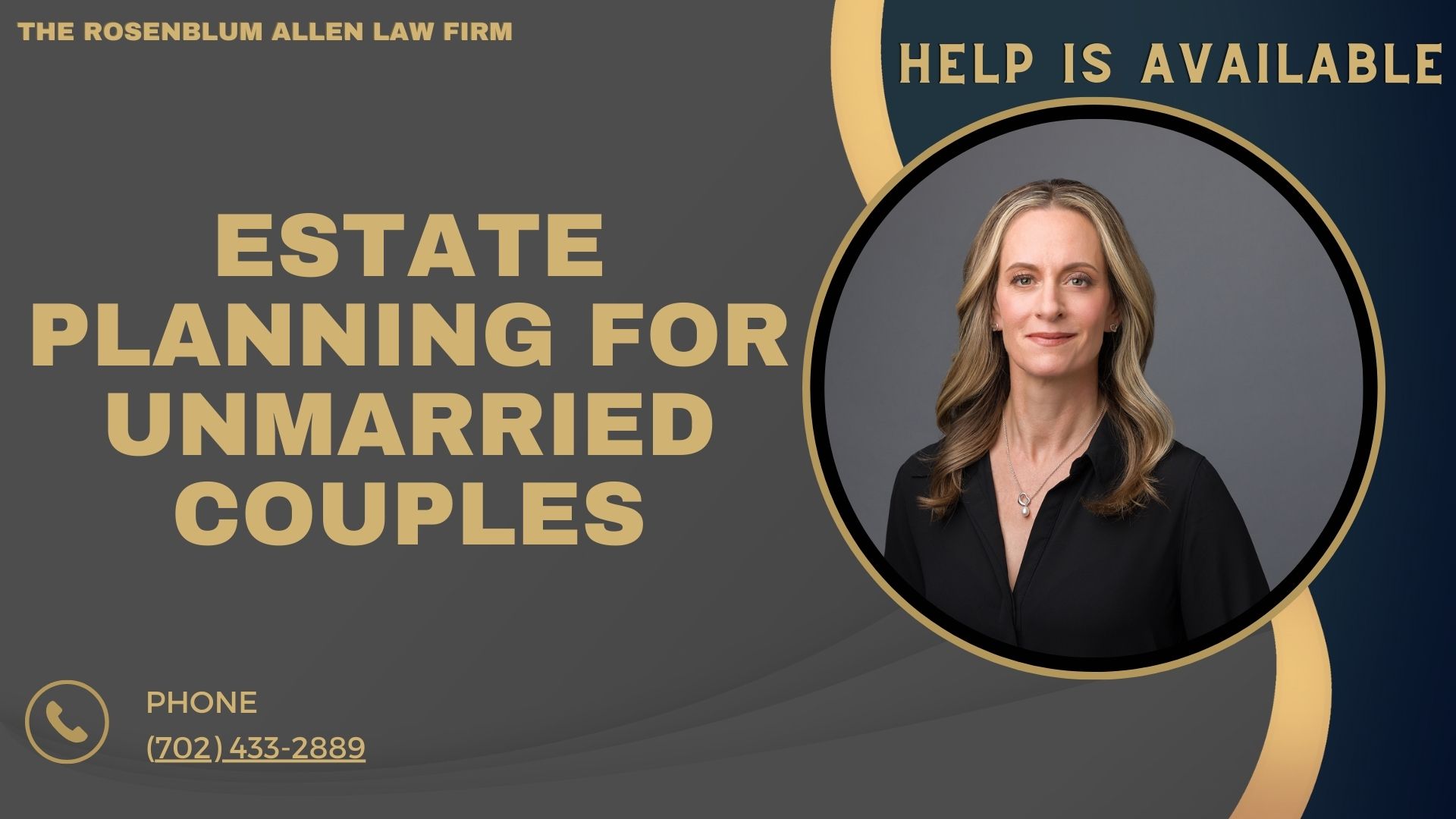Are you in a committed relationship but not married? You’re not alone. More couples are choosing to stay unmarried these days. But here’s the thing: estate planning is just as crucial for you as married couples. Let’s dive into why it matters and how to protect your future together.
 Understanding the Basics
Understanding the Basics
When it comes to estate planning, unmarried couples face unique challenges. Don’t worry, though. With the proper knowledge and planning, you can secure your future and protect your partner.
Legal Challenges for Unmarried Partners
Life can throw curveballs, and that’s where estate planning comes in. For unmarried couples, it’s not just about planning; it’s about creating legal safeguards.
Lack of automatic rights
Here’s a hard truth: in the eyes of the law, your partner might be seen as a stranger. Shocking, right? Without proper planning, your partner could be left out in the cold when it comes to:
- Inheriting your assets
- Making medical decisions on your behalf
- Accessing shared accounts
It’s not fair, but it’s the reality we face. That’s why taking action now is so essential.
Potential family conflicts
Picture this: You’re incapacitated, and your partner and family disagree about your care. Without clear legal documents, your family might have the final say – not your partner. It’s a scenario no one wants to face, but it happens more often than you’d think.
Importance of Proper Planning
Now, don’t let all this scare you. With proper planning, you can avoid these pitfalls. Estate planning for unmarried couples is all about:
- Protecting each other’s rights
- Ensuring your wishes are respected
- Avoiding legal battles and family disputes
Think of it as a love letter to your partner, saying, “I’ve got your back, no matter what.”
Key Estate Planning Documents
Alright, let’s get into the nitty-gritty. You’ll need a few key documents to organize your estate plan.

Wills and Trusts
These are the heavy hitters of estate planning. They’re your best bet for ensuring your assets go where you want them to.
Tailoring for unmarried couples
For unmarried couples, wills and trusts are extra important. Here’s why:
- Wills: This is where you spell out who gets what. Without one, your assets might go to your family instead of your partner.
- Trusts: These can be more flexible than wills. They can help you avoid probate and keep things private.
Pro tip: Consider a living trust. It can immediately give your partner access to shared assets if something happens to you.
Powers of Attorney
Think of these as your “just in case” documents. They let you choose who makes decisions for you if you can’t.
Financial and healthcare decisions
There are two main types you need to know about:
- Financial Power of Attorney: This lets your partner manage your finances if you cannot.
- Healthcare Power of Attorney: This gives your partner the right to make medical decisions for you.
Without these, your partner might be powerless to help you when needed.
Remember, estate planning isn’t just about what happens after you’re gone. It’s about protecting each other while you’re still here. So, take the time to get these documents in order. Your future selves will thank you!
Protecting Assets and Rights
Let’s discuss safeguarding what you’ve built together. It’s not just about the big stuff—it’s about all those little things that make your life together special.
Joint Ownership Options
Have you ever thought about how you own things together? It’s more important than you might think.
There are a few ways to own property jointly:
- Tenancy in Common: You each own a share, which you can leave to anyone in your will.
- Joint Tenancy with Right of Survivorship: If one of you passes away, the other automatically gets full ownership.
- Community Property: Only available in some states; this treats property acquired during the relationship as equally owned.

Beneficiary Designations
Remember that 401(k) you set up years ago? Or that life insurance policy? It’s time to dust them off and check who’s listed as the beneficiary.
Here’s a pro tip: Review and update your beneficiaries regularly. Life changes and your paperwork should, too.
Don’t forget about:
- Retirement accounts
- Life insurance policies
- Bank accounts
- Investment accounts
A quick call or online update could save your partner trouble later.
Tax Considerations
I know, I know. Taxes aren’t exactly a thrilling topic. But stick with me – this stuff matters!
Estate and Gift Tax Planning
As an unmarried couple, you might face different tax rules than married ones. But don’t worry; there are ways to navigate this.
Here’s the deal:
- You can give anyone up to $17,000 annually (as of 2023) without triggering gift tax.
- There’s also a lifetime exemption for estate and gift taxes (it’s pretty high – over $12 million in 2023).
But here’s where it gets tricky for unmarried couples:
- You can’t take advantage of the unlimited marital deduction.
- You might face estate taxes sooner than married couples.
What can you do? Consider:
- Setting up trusts to manage more considerable assets
- Using your annual gift tax exclusion strategically
- Exploring life insurance options to cover potential estate taxes
Remember, tax laws change. It’s a good idea to check in with a pro every few years to ensure your plan is solid.

Inheritance Laws
Let’s talk about what happens if you don’t have a plan. (Spoiler alert: You really should have a plan!)
State-Specific Intestacy Rules
Here’s a scary word for you: intestacy. It means dying without a will. And for unmarried couples, it can be a real problem.
If you die without a will:
- Your state’s laws decide who gets your stuff.
- In most states, your partner gets zilch. Nada. Nothing.
- Your assets might go to your family members instead.
Each state has its own rules, and they can be pretty complicated. But one thing’s certain – they usually don’t recognize unmarried partners.
Ensuring Intended Asset Distribution
So, how do you make sure your partner is taken care of? You’ve got options:
- Write a will: Spell out exactly who gets what.
- Set up a trust: This can give you more control and privacy.
- Use beneficiary designations: Remember those we talked about earlier? Super important.
- Consider joint ownership: But be careful – it’s not always the best solution.
The key is to be clear about your wishes. Don’t leave it up to chance – or state law.
Remember, estate planning isn’t just about money. It’s about taking care of the people you love. So take the time to do it right. Your partner will thank you – even if they never need to use the plan you put in place.
Professional Guidance
Alright, we’ve covered a lot of ground. Are you feeling a bit overwhelmed? Don’t worry – that’s normal. This stuff is complicated, so getting help can be a game-changer.
Seeking Legal Advice
Look, I get it. Lawyers can seem intimidating (and expensive). But when it comes to estate planning for unmarried couples, they’re worth their weight in gold.
Here’s why you might want to consider chatting with a lawyer:
- They know the ins and outs of your state’s laws
- They can spot potential issues you might miss
- They’ll make sure your documents are legally sound
- They can offer tailored advice for your unique situation
Think of it this way: You wouldn’t try to fix your car engine (unless you’re a mechanic, of course). So why try to navigate complex legal waters on your own?
When looking for a lawyer, consider:
- Finding someone who specializes in estate planning
- Looking for experience with unmarried couples
- Checking reviews or asking for recommendations
- Having an initial consultation to see if you click
Remember, this person will be helping you plan your future. It’s okay to shop around until you find the right fit.

Regular Plan Reviews
All right, pop quiz: When did you last look at your estate plan?
If you’re scratching your head, you’re not alone. But here’s the thing – your estate plan isn’t a “set it and forget it” kind of deal.
Life changes and your plan should, too. Consider reviewing your plan:
- Annually (make it a New Year’s tradition!)
- After any significant life event
- When laws change (your lawyer can keep you in the loop)
So, what’s your next step? Maybe it’s having a heart-to-heart with your partner. Or perhaps it’s scheduling that appointment with a lawyer. Whatever it is, take that step. Your future self (and your partner) will thank you.

Conclusion
After all, estate planning isn’t just about preparing for the worst. It’s about hoping for the best while knowing you’re ready for anything. It’s a gift you give each other – the gift of security, care, and saying “I’ve got your back” in the most practical way possible.
So go on, have that conversation, make that plan, and then? Go live your best life together, knowing you’ve cared for each other in every way possible.
Here’s to love, partnership, and facing the future—whatever it may hold—together.

Frequently Asked Questions
Q: Can my partner make medical decisions for me without a healthcare power of attorney?]
A: Generally, no. Without a healthcare power of attorney, your partner may not have the legal authority to make medical decisions on your behalf. Healthcare providers typically turn to immediate family members in such situations.
Q: How does cohabitation affect estate planning for unmarried couples?
A: Cohabitation alone doesn’t grant automatic rights in estate matters. It’s crucial to have proper estate planning documents in place to protect your partner’s interests, regardless of how long you’ve lived together.
Q: Are there any estate planning benefits to getting married?
A: In many states, married couples often have specific estate planning advantages, such as the unlimited marital deduction for estate taxes and automatic inheritance rights. However, with proper planning, unmarried couples can achieve similar protections.
Q: Can we create a joint will as an unmarried couple?
A: While joint wills are possible, they’re generally not recommended, especially for unmarried couples. Separate will offer more flexibility and can be easier to update individually as circumstances change.
Q: How do we handle estate planning if we have children from previous relationships?
A: This situation requires careful planning. Consider using trusts to provide for both your partner and your children. Be clear about asset distribution and consider discussing your plans with all parties to prevent future conflicts.
Q: What happens to our shared home if one of us dies?
A: It depends on how you own the property. If it’s jointly owned with rights of survivorship, the surviving partner typically inherits the deceased’s share automatically. If owned as tenants in common, the deceased’s share goes to their estate.
Q: How often should we update our estate plan?
A: While annual reviews are recommended, you should update your estate plan after any significant life event (e.g., buying property, having children) or significant changes in tax laws. At a minimum, review it every 3-5 years.
Q: Can my partner access my financial accounts if I’m incapacitated?
A: Without a financial power of attorney, your partner may face difficulties accessing your accounts, even if they’re joint accounts. A durable financial power of attorney can solve this issue.
Q: What’s the difference between a revocable and irrevocable trust?
A: A revocable trust can be changed or terminated during your lifetime, offering flexibility. An irrevocable trust generally can’t be altered once established but may provide tax advantages and asset protection benefits.
Q: How can we protect our estate plan from potential challenges by family members?
A: Clear, legally sound documentation is critical. Consider including a no-contest clause in your will, being specific about your wishes, and potentially discussing your plans with family members to prevent surprises.

Glossary
Beneficiary: A person or entity designated to receive assets or benefits from an estate, trust, or financial account.
Cohabitation: The state of living together and sharing a household without being married.
Durable Power of Attorney: A legal document that remains in effect if the principal becomes incapacitated, allowing the appointed agent to make decisions on their behalf.
Estate: The total of a person’s assets, legal rights, and interests at death.
Estate Tax: A tax levied on the transfer of a deceased person’s estate.
Gift Tax: A tax imposed on transferring property from one individual to another while receiving nothing, or less than total value, in return.
Healthcare Power of Attorney: A legal document that appoints someone to make medical decisions on behalf of another person if they become incapacitated.
Intestacy: The condition of dying without a valid will in place.
Joint Tenancy with Right of Survivorship: A form of property ownership where two or more people own equal shares, and upon one owner’s death, their share automatically transfers to the surviving owner(s).
Living Trust: A trust created during a person’s lifetime that can be revoked or amended.
Marital Deduction: An unlimited deduction that allows married couples to transfer assets to each other without incurring gifts or estate taxes.
No-Contest Clause: A provision in a will or trust that disinherits beneficiaries who challenge the document’s validity.
Probate: The legal process of validating a will and distributing assets according to its terms or state law if there is no will.
Revocable Trust: A trust that the grantor can alter or terminate during their lifetime.
Tenancy in Common: A form of property ownership where two or more people own distinct shares that can be sold or transferred independently.
Trust: A legal arrangement where one party holds property or assets for the benefit of another party.
Trustee: The person or entity responsible for managing and distributing trust assets according to the trust’s terms.
Will: A legal document specifying how a person’s assets should be distributed after death.

Further Reading
Here are some additional posts that can provide valuable information on estate planning:
“Tips On Estate Planning: How Not to Gamble Your Future Away” – This post offers useful tips and guidance to help individuals navigate the estate planning process and make informed decisions to protect their assets and secure their future.
“Estate Planning Services” – This post discusses the importance of estate planning services and highlights the various professional services available to assist individuals in creating comprehensive estate plans.
“5 Simple Things Every New Parent Needs To Know About Making A Will” – This post focuses on estate planning considerations for new parents, highlighting important factors to consider when creating a will to protect their children’s future.
“Estate Planning Probate: Las Vegas Attorney” – This post provides insights into estate planning probate, discussing the role of an attorney in guiding individuals through the probate process in Las Vegas and ensuring their estate plan is properly executed.
“What is the Estate Planning Process in Nevada?” – This post outlines the estate planning process specific to Nevada, discussing the key steps involved and providing an overview of the legal requirements and considerations.
“Damar Hamlin – The Need for Estate Planning” – This post sheds light on the importance of estate planning, emphasizing the need for individuals to proactively plan for their future and protect their assets, with a particular focus on the insights shared by Damar Hamlin.
“Estate Planning for Unmarried Couples Is Necessary In Nevada” – This post addresses the significance of estate planning for unmarried couples in Nevada, highlighting the unique considerations and legal implications they should be aware of to protect their interests and wishes.
“Estate Planning Mistakes: Help for Nevadans” – This post discusses common estate planning mistakes that individuals in Nevada should avoid, offering helpful guidance and tips to ensure their estate plan is comprehensive and effective.
We encourage readers to explore these resources to gain a better understanding of estate planning and its importance in securing their future and protecting their assets.

Offsite Resources You May Find Helpful
Here are two offsite resources related to estate planning for unmarried couples in Nevada:
-
State Bar of Nevada: Offers comprehensive information on estate planning, including guides and FAQs specific to Nevada law.
-
American Bar Association: Provides an overview of estate planning basics, including information relevant to unmarried couples.

What's Next?
If you’re in a committed relationship and want to ensure your loved one is taken care of if something happens, an estate plan is essential.
But where do you start? That’s where an Las Vegas estate planning attorney can help.
We bring over 20 years of experience and knowledge to create the perfect plan for you. Plus, when you choose us, you get our attention and 24/7 availability.
We will help you navigate the complex legal process and answer any questions or concerns. So what are you waiting for?
Call us at (702) 433-2889, and let’s start creating your perfect estate plan today.




